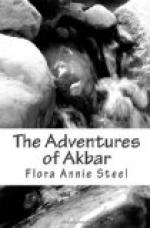He was half angry, half ready to cry, so Roy, though his own heart failed him as he thought of the dangers of the road, had to soothe and comfort him by saying, as cheerfully as he could, that they would come before long. But would they? Now that the relief of finding the children were safe was over, poor Roy began to see the difficulties before him. If those others did not come, what would he, a mere lad, do? How could he care for his little master and mistress? They had had their breakfast, it is true—Roy forgot he had had none himself!—but what could they have for supper? He could not even think, he felt too giddy and tired even to sleep; so, after he had rolled his fur coat into a soft pillow for the little Prince and Princess, who were drowsy for their mid-day rest, and covered them over with their own, he sat with his head between his hands, his eyes closed, wishing he were not so stupid, wishing he could only think of something to do; for in reality he was quite wearied out. If the others did not come! Of course they might come at any moment; and yet the moments passed to minutes, the minutes to hours, while the children slept in the sunshine, and Roy felt that he was a fool.
And then something cold touched his hand. He opened his eyes and saw that it was Tumbu’s nose; Tumbu, who had something strange in his mouth—something like a rabbit and yet like a squirrel!
In reality it was a fresh-killed young marmot, an animal that lives amid the snow and ice and rocks of the very highest hills. Tumbu, having handed over charge of the children, must have gone off on his own hunting, found a colony of the quaint creatures, and, as usual, brought home his bag! Roy did not in the least know what the marmot was, but he saw it was something to eat! The relief was too much for him! Here, at least, was supper. He flung his arms round Tumbu’s neck and burst into tears, murmuring with choking sobs that he, Roy, had been foolish, but Tumbu was a wise, wise, good doggie. And so he was!
After this Roy felt better, and having, as all Indian boys used to have in those days, a flint and steel with him, began to look around for fuel with which to light a fire and cook the supper. There were, of course, no trees and no bushes; but right away at the farther end of the long valley there were some patches of very dark green. They did not look promising, but he would go and see. They proved to be a creeping sort of evergreen plant that trailed its stiff branches right on the very ground. He picked a bit, and on trying to light it, found to his surprise, that it blazed up in a fierce flame. For it was juniper, and so full of resin.
He now had the possibility of fire, so that evening the little cup in the hills held quite comfortable encampment.
Roy had brought down the sledge, and using the swords and their scabbards as supports, had made a lean-to tent against a warm rock out of the strip of shawl. In this he had strewn juniper branches to make a soft bed, and the children could just creep into it. Then they had the marmot, roasted in its skin, for supper, and all the three were too hungry to ask themselves if marmot flesh was as toothsome as rabbit or as bitter as squirrel! And Tumbu ate the bones with an air as if he would say, “It is not bad, but to-morrow I must catch two marmots.”




